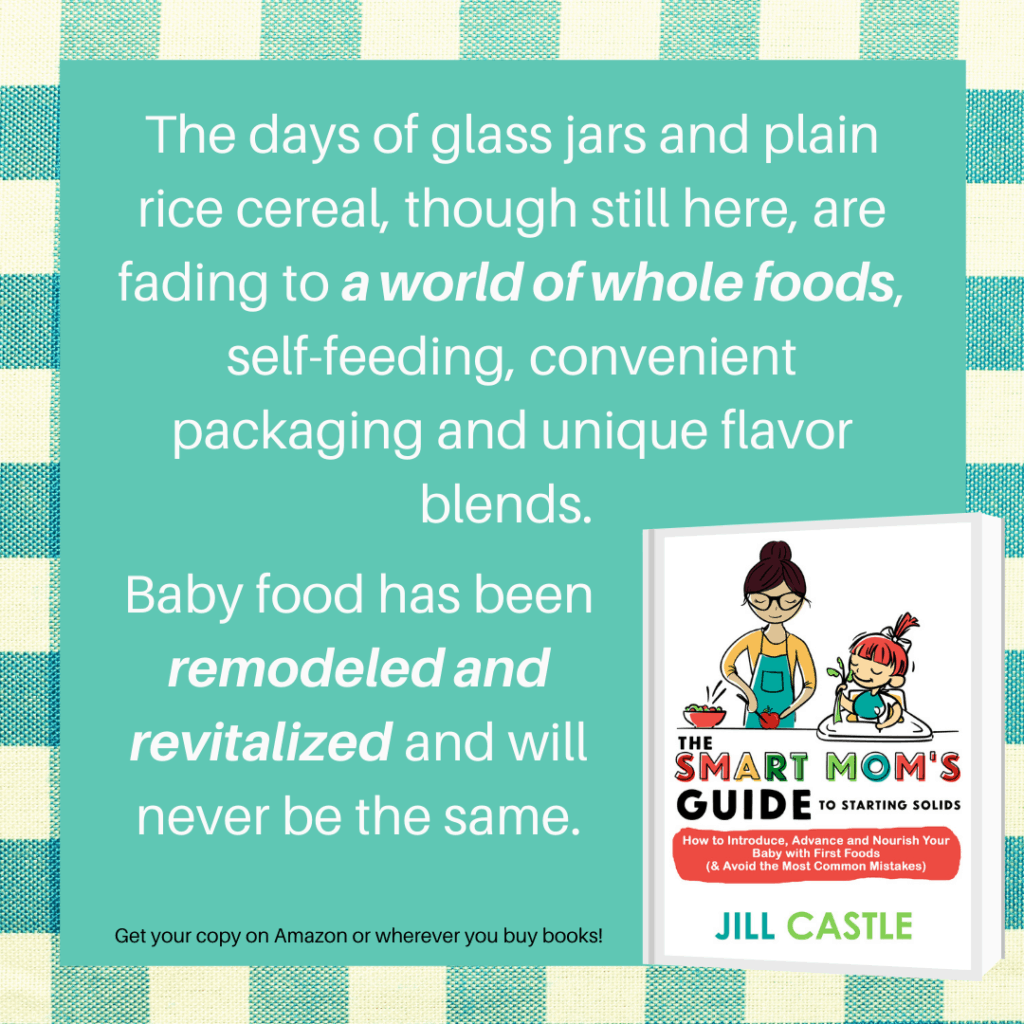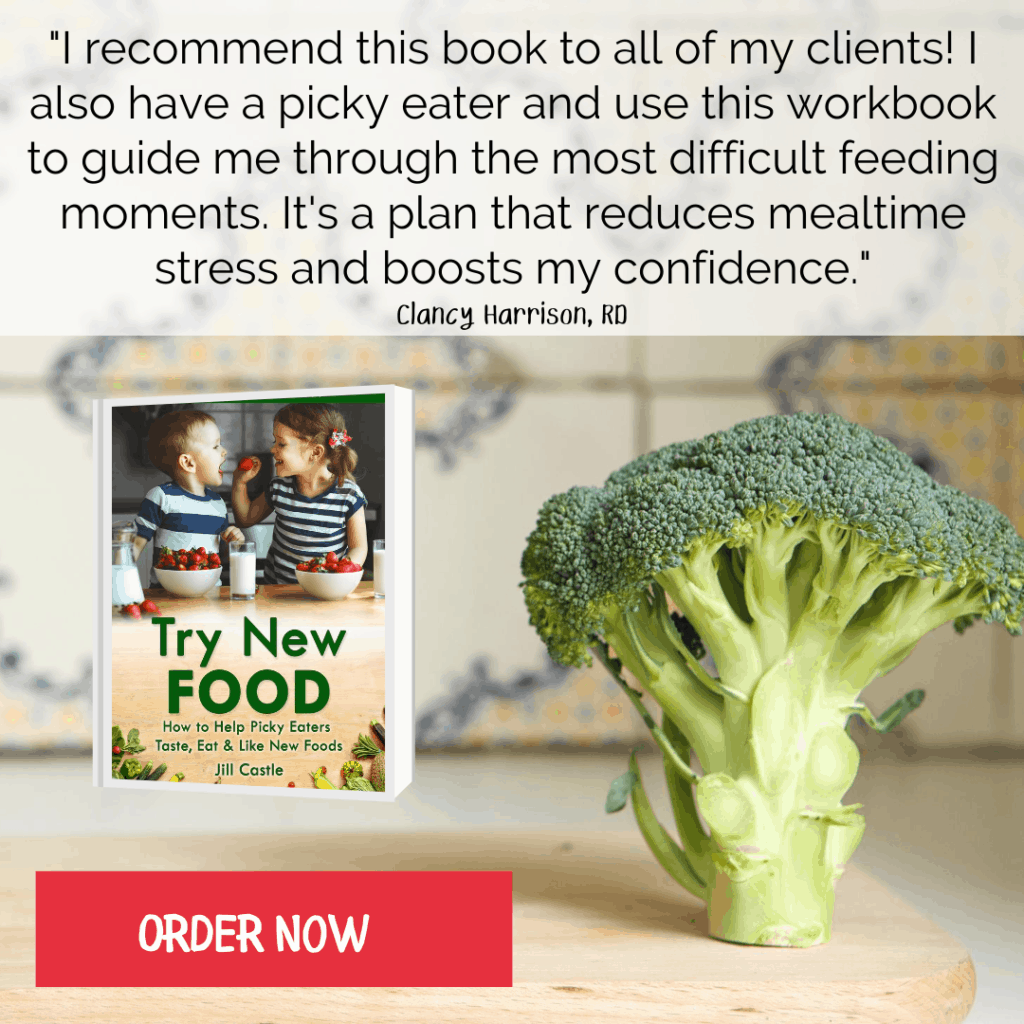The Most Common Reasons Your Baby Refuses to Eat
October 22, 2023
When your baby refuses to eat it can be very stressful. One thing that will ease your stress is understanding why your baby isn’t eating.
Food refusal in infants and young children is a tough reality for parents to accept. I see some common reasons why babies taper off in their eating.
In this article, I’ll cover the most common reasons why babies refuse to eat and how you can help.
I’ll review:
- Constipation in babies
- Boredom with the same food options
- Pain
- Feeding practices that are counter-productive
- Readiness to eat
- Medical condition
- Sensory issues

Why is My Baby Not Eating?
Your baby ate yesterday. And the day before. But, today, she’s not having food. What’s going on?
One of the most worrisome issues I see new parents face is when their baby refuses to eat. From being sick to being extra sensitive to texture in food, there are several reason why this happens.
When your baby is not eating, it can be a temporary thing, or it can develop into a concerning pattern.
Many babies have a good appetite in the first year or two of life. They grow at a rapid pace. Their bodies lengthen and they gain weight. They’re in a growth spurt. Even their brains are getting bigger and learning is taking off at quite a clip.
All of this infant growth and development takes energy. As a result, babies generally have a good appetite and a natural drive to eat.
Yet, sometimes babies just won’t eat as well as expected, or as well as they used to. You’ll need to discern whether this is a temporary phase, or a pattern that’s developing.
Most babies who are in a temporary food refusal phase will show interest in eating and get back on track within a meal or two. If your baby is not eating and it’s becoming a pattern, he may need more help.
If baby is losing or not gaining weight, appears dehydrated, or is regressing to the bottle and not regaining interest in eating food, then it’s time to see the doctor.
Common Reasons Your Baby is Refusing to Eat
As a pediatric nutritionist, by the time I see babies who are poor eaters, they’re already in a pattern of not eating enough solid foods and growth is faltering.
When we get to the root of the challenges, several things have come together to create the issue. It’s not usually one thing, but a few things that have created the “perfect storm.”
5 Reasons Your Baby Refuses to Eat. #babyfood #firstfoods #startingsolids #healthyeating Click To Tweet1. Your Baby is Constipated
When babies transition from a liquid diet and start to eat solid foods, constipation can set in. Liquids such as breast milk or infant formula are fairly easy to digest and absorb in the intestines. But add in solid food and the gastrointestinal tract has to do more work.
This can slow things down. And this can cause baby losing appetite.
I had a similar experience with one of my kids. When my first born transitioned from breast milk to solids, we had a heck of a time with constipation. In part, her digestive system was getting used to solids and a new baby feeding schedule.
When babies are constipated, it causes a feeling of fullness. This alone can cause a loss of appetite. If the intestinal tract is full of stool, the stomach may fill up, and this may lead to a lost appetite and less eating.
You can help your baby if he’s constipated with home remedies such as diluted prune juice, but take care to use only those that are appropriate for an infant. Talk with your pediatrician if you’re worried. Also, as your baby grows, you’ll want to incorporate more fiber into her diet.

2. Your Baby is Bored
Recently, I met a child who, at the age of 22 months, was still eating baby food. You could say by this point, he was hooked on smooth purees and was very disinterested in textured food other than crunchy crackers and cereals.
He was also delayed in his self-feeding skills.
Pureed foods are great and many babies love them. Some babies love them too much, getting hooked on them. Others don’t get challenged with different textures, receiving “safe” purees and familiar flavors.
After you introduce solids, and by 7 months, most babies should be moving on to more food texture, flavor and food experiences. This is the typical age for a texture upgrade.
Babies and young toddlers are naturally curious. They want to explore and try new foods. Holding them back when they are developmentally ready to move on can delay their overall developmental progress, including language skills, self-confidence and of course, nutrition.
One study showed that children who didn’t move on to more textured foods like chopped table food and finger foods by 9 months showed significant picky eating later on at 7 years of age.
If your baby is refusing purees and spoon-feeding, or stuck on baby food pouches, he may be bored with food. Skip to chopped table foods or try a baby led weaning approach, instead. Boredom may be a sign your baby needs more texture, flavors, and more autonomy (Hello, finger foods!) with self-feeding.

3. Your Baby Has a Poor Appetite Because She’s in Pain
Teething is a common culprit for a baby not eating. His mouth hurts. But there are other reasons for pain that may be contributing to why your baby won’t eat.
- An illness involving a sore throat or ear pain may cause short-term food refusal.
- Reflux (a condition where baby’s stomach acids creep up into the esophagus) can cause pain and impede interest in eating. If this is chronic, your baby may associate pain with eating and develop a pattern of disinterest.
- Colic and other digestive problems including gas, cramping or other symptoms can be problematic.
- Food allergies or intolerances such as esophageal esophagitis, (EoE), oral allergy syndrome (OAS) or a food allergy to one of the Top 9 (ie, milk, egg, wheat, etc) can cause pain, discomfort and reduce food intake.
- An acute illness like a cold can turn any baby off from eating. However, most babies will resume eating when the illness passes.
If you suspect a more involved, underlying medical condition is the root of your baby’s refusal to eat, see your doctor.

4.You’re Using Counterproductive Feeding Practices
Feeding should always be a positive experience, for any child, at any age. When it’s not positive, young children can make negative associations with eating. For example, if your child is eating with a baby-led weaning approach and is gagging frequently, this could be negative for him.
The same goes for spoon-feeding your baby. If you force bites of food when your baby is full and doesn’t want any more, you could trigger a negative association with coming to the highchair to eat.
While most babies will recover from minor incidents like gagging, some babies who are more sensitive to their environment, transitions and changes, or a have a sensitive temperament may imprint these negative experiences.
You can imagine, this can make a baby withdraw from food, or at least negatively influence her desire to eat. To avoid this situation, brush up on your feeding style and feeding practices so they are positive, connected and use responsive feeding – this will help you create a positive feeding experience for your baby.
You can learn that and more in my book, The Smart Mom’s Guide to Starting Solids.

5. Your Baby is a Late Bloomer (Delayed Signs of Readiness)
Babies are unique and have individual characteristics, but they all follow along a developmental scheme. Tackling the different stages of development happens at different times and reflects what we call developmental readiness.
We have stages of readiness for solids, which is a guideline to help you know when your child is ready to take the next step. For example, babies are generally ready to begin first foods around 6 months.
Some are ready earlier, some are ready later.
It’s important to watch for the signs. (Read more about those here.) Some babies are slower to show signs of readiness for solids. They are late bloomers, if you will. Kind of like my late readers!
No matter how much we practiced reading skills, they weren’t early readers. They learned on their own time table.
Some children are poorly coordinated in their ability to chew and manipulate food in the mouth. They need more practice. Some find textures offensive and need more time and experience with them to warm up. Other babies are more sensitive to the sensory characteristics of food. They may gag when they see, touch or taste food.
Don’t fret too much if your baby is a late bloomer. Stay alert to signs of readiness and provide opportunities for more experiences with food.
One thing you can do is plop a spoonful of baby food puree on the high chair or a spoonful of chopped food and just let your baby mess around with it.
If your baby is holding or touching food, show him how to bring his hand to his mouth. Remember, keep it positive and let your baby lead. No forcing!
If your baby isn’t ready and you force it, this won’t be fun or pleasant and may lead to disinterest or a situation where your baby refuses to eat.
6. Food Intolerances
Yet another reason that babies may stop eating is due to a medical issue that may be unknown. For instance, a food intolerance may turn a baby into a picky eater or one that refuses to eat certain foods.
Or, a significant gastrointestinal disorder like celiac disease may disrupt your baby’s interest in eating. Even a sore throat, ear infection, or other infection can stall a baby’s interest in eating.
7. Sensory Issues
Some babies and toddlers show early signs of a feeding disorder like extreme picky eating. They may have trouble coordinating their mouth for chewing, they may “pocket” food, or be highly sensitive to food textures.
Get More Help if Needed!
How long should you wait to do something when your baby refuses to eat? Should you wait it out? At what point is waiting it out potentially causing more challenges down the road?
In most cases, your baby will sort things out on his own, provided you offer regular, balanced meals and snacks, offer small portions, have a positive feeding environment, and stay relaxed.
But Here are the Signs You Need to Visit the Doctor
It’s time to head to the doctor’s office if your baby:
- isn’t moving on to more textured food by 9 months
- still refuses to eat
- shows little interest in eating
- seems distressed with eating
- appears dehydrated
- is losing weight
In this case, it’s best to further investigate the root issues, such as a food intolerance or allergy, digestive problems, or sensory challenges.
Perhaps your baby needs a feeding evaluation with an occupational therapist or a speech therapist specializing in feeding, or you need a dietitian to evaluate your feeding approach including the feeding schedule, food offerings and feeding interactions.
Help Your Baby Love Food [Infant Feeding Resource]
Feeding your baby should be a positive, learning experience. For more resources and support in this area, check out the following materials:

Try New Food Workbook is a very helpful resource for parents who may be entering into the picky eating phase.
It’s also a great way to learn how to prevent picky eating!


This post was updated on October 2023 to include more reasons and resources.










